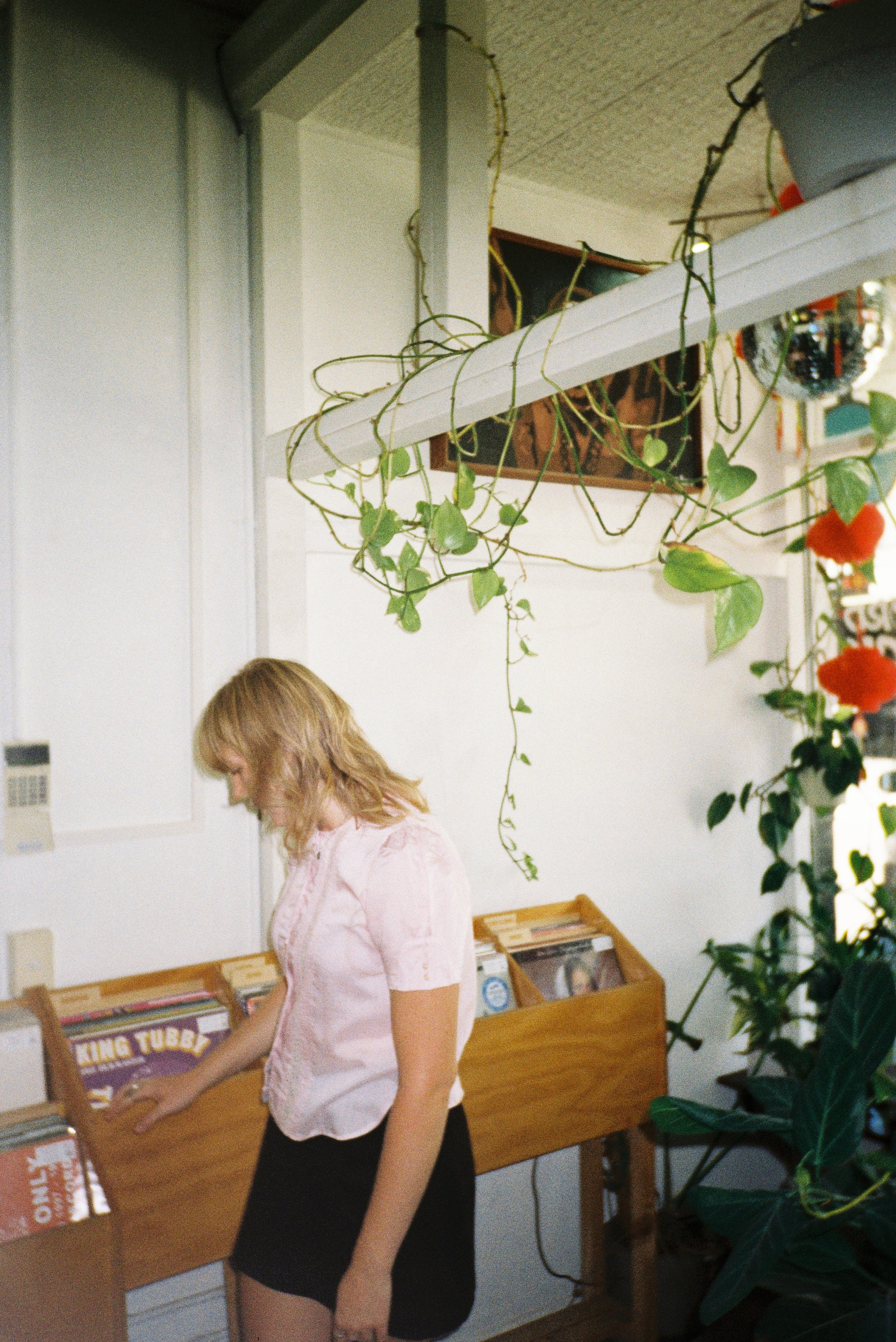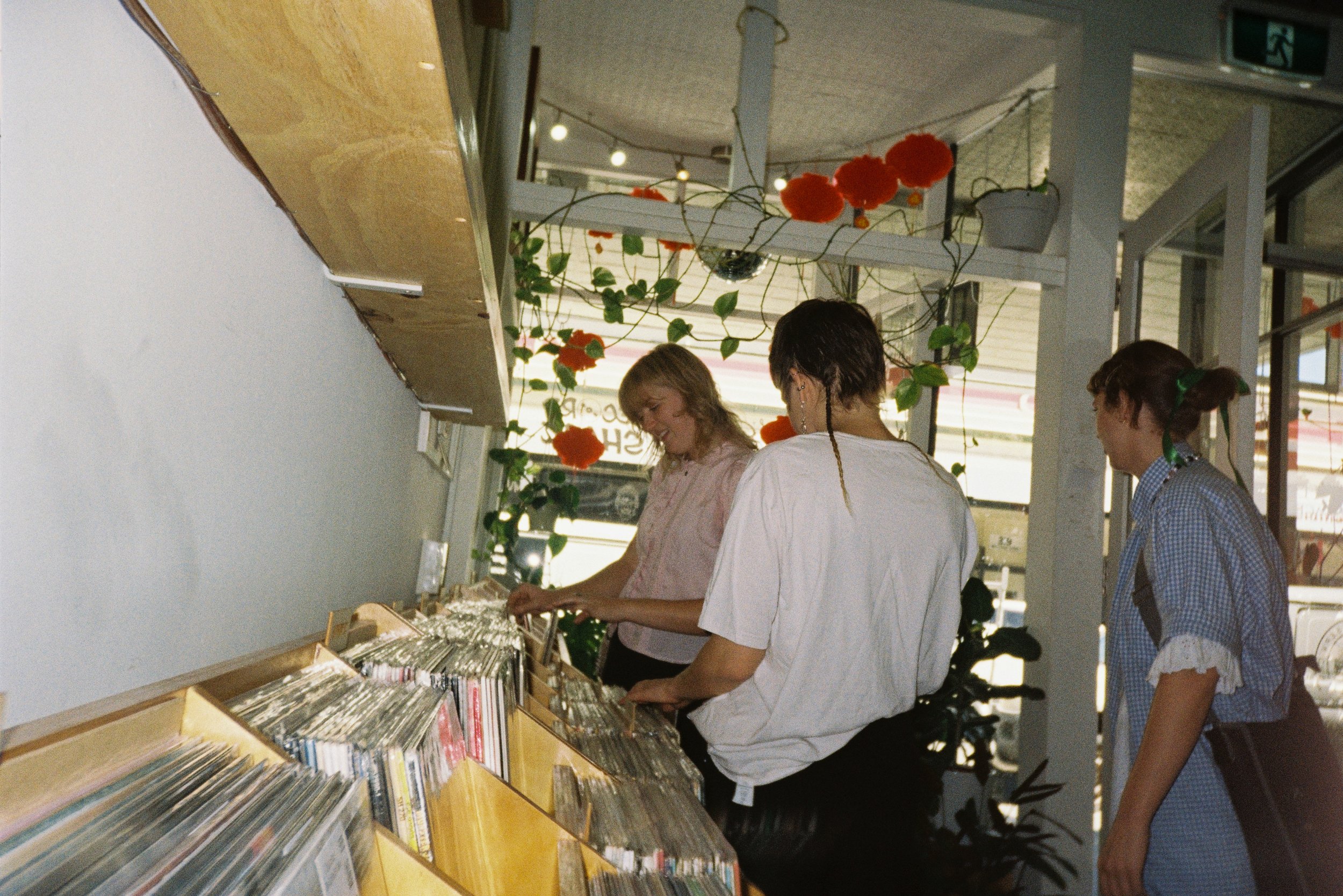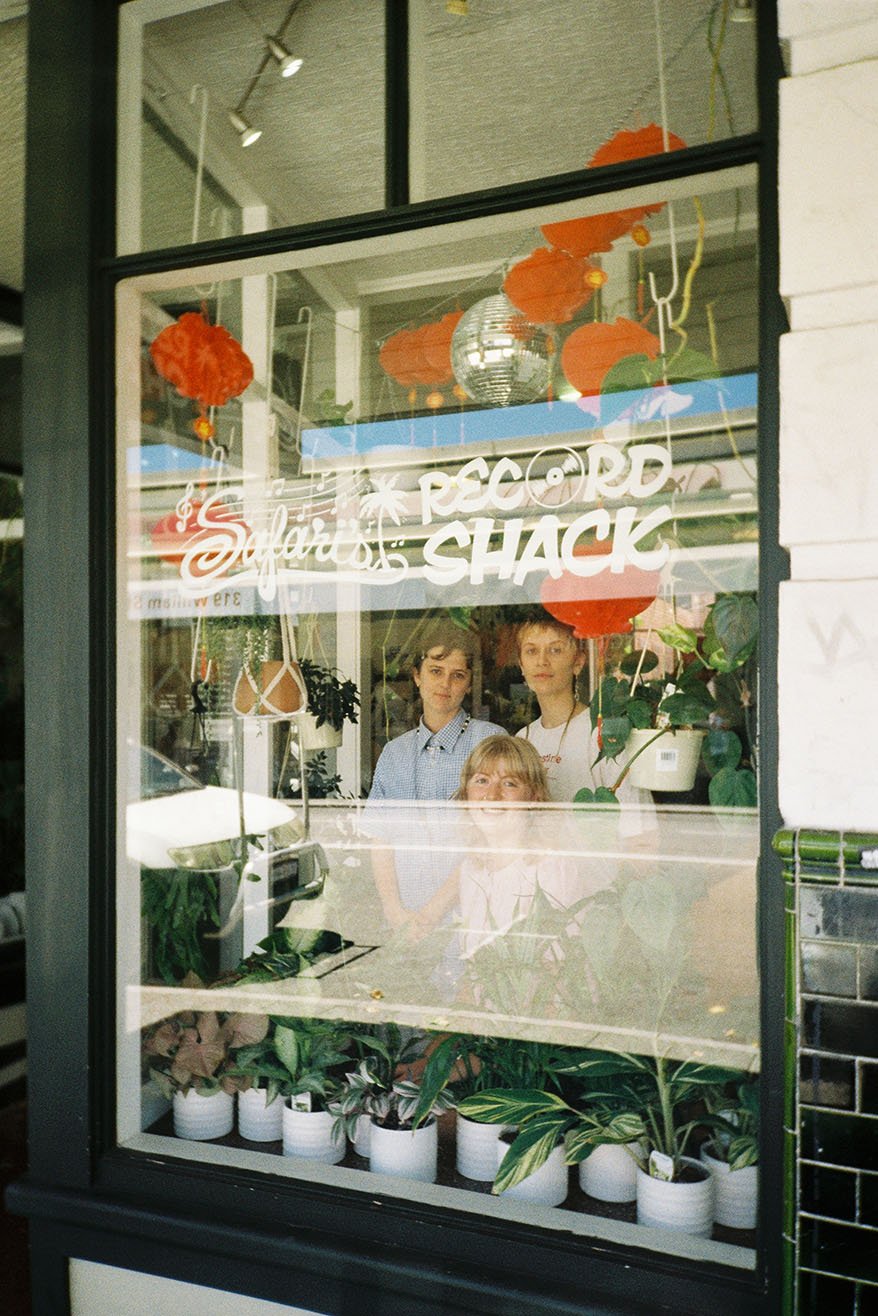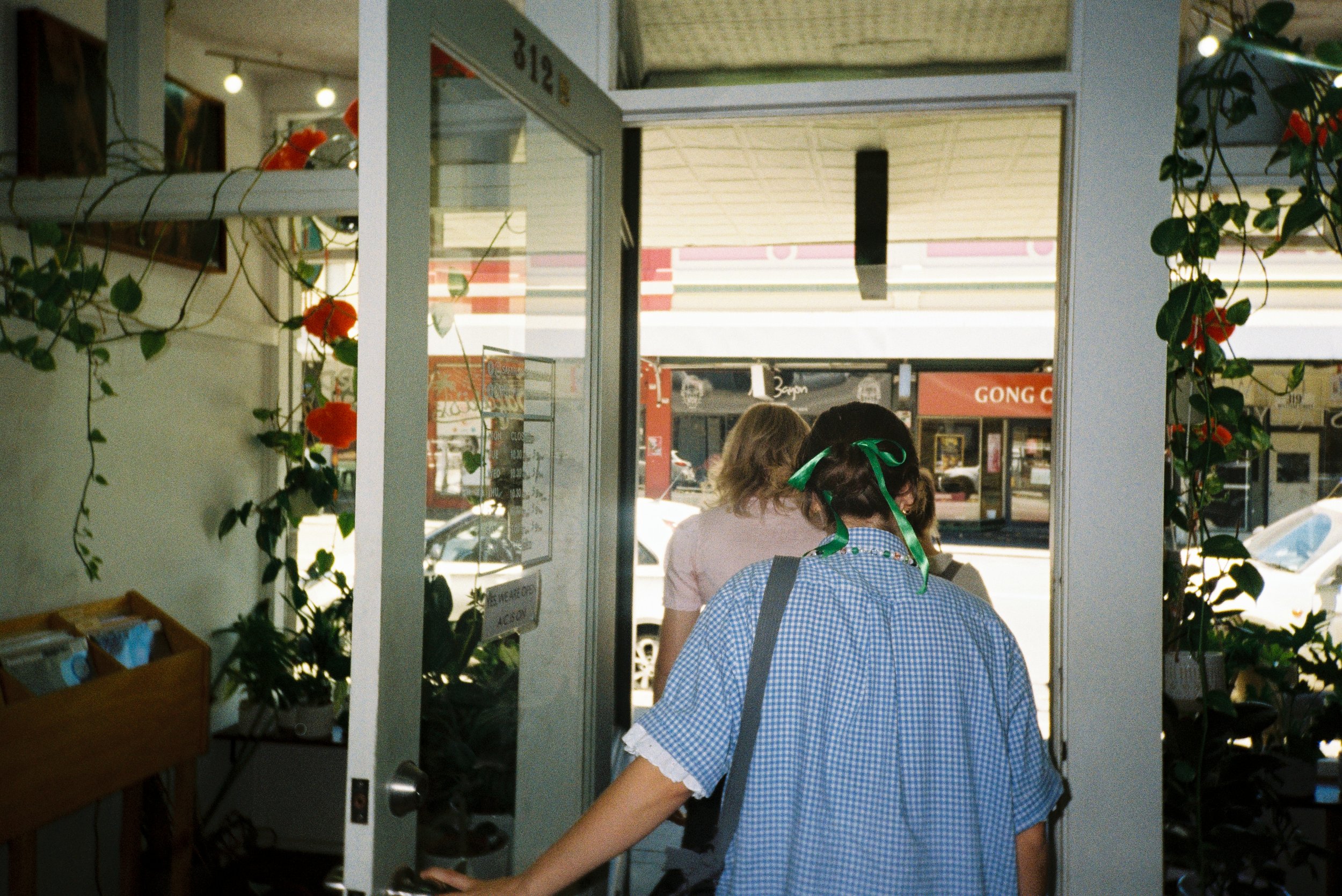Song craft with Clancy Davidson, Annika Moses, and Anna Schneider.
Three of the WA’s best young songwriters chat sharing and living music, finding inspiration in community, and evolving as artists in Boorloo/Perth and beyond.
Interviewed with Rockton Records’ Ryan Borrett at the State Library of Western Australia and photographed by Harvey Bricey at Safari’s Record Shack on Tuesday February 6, 2024.
Clancy: Most of the time I would probably start with just acoustic guitar, but because my skill level on the guitar isn't crazy good, it's hard to come up with new ideas all the time. So I've had to kind of delve into maybe doing more of a recorded thing, like I've been enjoying starting with a bassline or something. It just makes this song come out differently. I think it's really fun to experiment, like starting on different instruments, or even just starting with a melody first, and then writing chords in. There's something so nice about just sitting down with a guitar and then just coming up with something on the spot though. That will always be beautiful.
Annika: Really feeling your feelings?
Clancy: Yeah!
Annika: I definitely start things in lots of different ways, and depending on what project. I mean, all of my music is kind of...I always think about this quote from Blood Orange/Dev Hynes, when he said “I've never written a song about love…” or something, I'm just like, 'Oh, all my songs are about love…’
[laughs]
Annika: I think something that we all share, maybe, is we do have that emo streak. Because in both of your music I think it feels really authentic and connected to a sense of feeling and being in your body, and also maybe a little bit laughing at that over-emotionality, but kind of owning it.
Clancy: Thank you!
Annika: But in terms of starting; Nika Mo is often at the piano or guitar, having a bit of a moment, you know, feeling my feelings. Lots of the more recent Nika Mo stuff is written through a big period of depression, anxiety, breakup, and playing guitar is a way for me to pass the time, especially when I'm feeling like passing time is a really hard thing to do.
Ryan: Do you find the feeling or the playing comes first? Or is it neither, and you can’t really separate things like that?
Annika: It’s different each time. Often I'll have this kind of a feeling where I need to get to the bottom of it. And so by writing I'm kind of working through that, but also trying to kind of find that essence of 'What is it I'm actually sad about or upset about?’ or 'What am I grieving right now?', or the particular flavours of our emotions and love and heartbreak and other things.
Ryan: Kind of like a question and answer.
Annika: Yeah for sure. It's weird to think 'Where is that coming from?', is it in the atmosphere? I guess it's from us, but it kind of feels like I'm a conduit to something bigger.
Anna: Absolutely. I feel like that feeling of needing to write songs to work through something is definitely at the core of whenever I've written. I don't always understand what's trying to come out at first. And I'm like, okay, these are words, but what do they mean? And trying to reflect on my life and what's actually creating inner turmoil, or worry, or just unresolved feelings? I think when you finally understand what it is about, and what you are trying to write, the song kind of has an easier path to fall into. But often when I'm working on a song I have no idea what it's about. Like the other day I was asking someone, and I played it for them, and I asked, 'What do you think?' and they're like, 'I don't know!'. No wonder it's not finished, and I just don't know how it would ever get finished, because I just don't understand it yet. But I'm hoping that in time, maybe I'll listen to it again and think, 'Oh, that's what I was trying to say'. Maybe even the thing I'm living through at the moment hasn't resolved itself or the interaction with that person hasn't, I don't know…fruited. It doesn't have an ending yet, so the song might remain unfinished.
Annika: But I also love that sense of trust or faith that our body and internal systems have this kind of intelligence that we might not fully understand. And intuition, and the gut feeling, where, we have all this kind of information that we don't cognitively understand.
Clancy: Yeah that's funny that in this conversation, I just got hit with this anxiety of, 'What if I like write something and I put the feeling into words, and that's not really what I'm feeling but now I've gaslit myself into thinking that's how I'm feeling?'. It's like, I've got no control over how I'm doing!
Anna: But it means something for someone else as well.
Clancy: Yeah!
Anna: So it’s okay if it's not necessarily reflective of you. Because if someone else is gonna hear that and be like, 'That's exactly what I feel', then that's gonna be their anthem for whatever they're going through. That's the other side of being a songwriter.

“I feel like that feeling of needing to write songs to work through something is definitely at the core of whenever I've written…Maybe even the thing I'm living through at the moment hasn't resolved itself or the interaction with that person hasn't, I don't know…fruited.” - Anna Schneider
Annika: It may have started with me, but it's definitely not about me. Like by the time it gets to being recorded and being in the world…
Clancy: You’re a different person almost.
Annika: And it means you can't anticipate what it means to other people. And that's some of the relief and release that I found in putting music out; 'Cool! I don't have be the custodian of this anymore!' - this is for other people to find whatever they find in it.
Anna: Definitely.
Clancy: Wow. How long does it take you to write a song?
Anna: This sounds really bad…but like a year!
[laughs]
Clancy: No wonder they’re so good!
[laughs]
Anna: I think I'm just really fussy with my own songs. There's times where I've sat down and I've written a song in like an hour or something. And I love it, I think it's a good song. But I feel like the ones that I might be most proud of, and maybe the fact that it took a year is why I feel proud of them, can take a while. Some of them are quick though. My answer is both! How about you?
Clancy: I reckon the songs I like the best I've written them in like 15 minutes. Because I think it's the overthinking of it all that I'm like, 'Oh, that was really fucking cheesy!'. But if it's just something I've done quickly and thrown away I don't overthink it. So I just let it be cheesy. Which is cute.
Ryan: Do you think there is an unconscious thing happening, like when you’re washing the dishes, or…?
Anna: Oh yeah definitely.
Clancy: What sprang to mind is swimming laps in the pool recently. Every time I just couldn’t stop counting; every stroke I did was like ‘1, 2, 3, 4’ then I got really pissed off with myself because all I could do was count, and I was thinking while I’ve got this single track mind on right now I’m going to think of a song I’m trying to make work and work through it that way. It was weirdly good for that!
Anna: That’s so cool! What song did you finish?
Clancy: Oh I didn’t finish it, I just thought about it.
[laughs]
Clancy: I’m definitely one of those people that work on a lot of stuff rather than just one…I’m a quantity over quality person!
Ryan: How do you know when some of those won’t make the cut and go in the bin?
Anna: Gives you the ick…
Annika: Do you reckon the band (smol fish) provides that sounding board?
Clancy: I think so. But sometimes you send a voice memo to the group chat and it gets no replies…okay well I guess I should absolutely never revisit that again. I don’t know maybe everyone’s at work, but I took that personally.
[laughs]
Annika: With Nika Mo, I feel like I generally take quite a long time from writing to then recording to then releasing. We’ve got an EP that's mastered and going to come out soon, but it's all these songs that I wrote in 2018 or 2019 like 'Purple Suburbia', 'Faces on the Ceiling', a band version of 'Divination'. So they feel really old to me. But maybe that’s part of the process of figuring out if I still like them enough after years of playing them. But I also do it for those moments where someone comes up to me after a gig and asks 'Is Faces recorded?' or whatever. Maybe it's a process of leaving it up to the people who received the music to wait and see how they respond to it, and then decide.
Anna: Yeah you can’t help but want to give them that. There’s some songs where I go ‘Oh I hate this song’. But you play it and someone goes ‘That’s my favourite song!’, so it’s like okay, I’ll look after it for you!

Anna: Sometimes there are artists or songs I hear where I just don’t know how I could write about that. Maybe I just haven’t lived it yet.
Annika: We’re all still super young. Like, ‘Woah, I’m a baby!’
Clancy: It sucks that, especially the Australian commercial, or maybe not commercial but contemporary, music world isn’t really the best for older woman artists.
Annika: But that’s it, like what the fuck is going on? I’m sure I’ll have some kind of moment past that insecurity. I think we’re going to be writing really good music when we’re in our 30s. But thinking about how parts of the Australian music culture doesn’t support, or doesn’t want to see women past…
Clancy: 22
[laughs]
Annika: Yeah it’s scary and weird. But I’m also hopeful that it’s changing, like us and other independent artists might be changing that dialogue or culture.
Clancy: I guess that’s one of the benefits from newer platforms where your music can be broadcast all over the world, so you can kind of escape that Australian curse.
Anna: I feel like that’s definitely something I’m really just realising now, that there are pockets in Australia that are going to be accepting and changing, and you can reach those same pockets that exist in other countries too.
Annika: But I think that as you said, there are those pockets of really cool people in Australia, like organisers and folks invested in supporting independent musicians in a really good way.
Ryan: You were on the road recently right?
Annika: I went on an east coast tour last year organised by Half Strange. It was a tour of all women, non-binary, and queer folks where I felt so affirmed and measured in looking up to these artists who are more experienced and had me thinking ‘There is a future!’. There is that community and people who value the same things as me and are invested in community and aren’t giving in to the capitalist grind. It was really special. And I feel like we have some of that here in Boorloo/Perth.
Anna: Thank god for RTRFM.
Annika: I mean come on, we’re so lucky.
Anna: Sometimes I think I wouldn’t feel the need to exist musically if RTR didn’t champion local music, and different music. They give you so much to look forward to.
Clancy: It’s so good!
Annika: I kind of didn’t realise, but community radio to the level of RTR doesn’t really exist in other cities to the same extent of 24/7 programming, local presenters, and all the events they run.
Ryan: The events side is huge.
Anna: Do you think isolation is why it’s like that? Like a need to support each other? I always feel the WA music scene just lifts each other up and it’s like family despite what other dynamics exist in it - we always want people to get out and make it, like ‘Go make it big!’
[laughs]
Annika: I think we do create our own support network and platforming local artists, because we have to.
Ryan: There’s an imperative, because the music is just too good that it can’t slip through the cracks, it needs to be heard and shared!
Annika: And that’s kind of the impetus behind Rockton.
Ryan: Yeah it is.
Anna: Do you enjoy co-writing?
Clancy: I really, really like it. Maybe I've never written anything with someone else that was 50/50, like starting from scratch. But I really like working like on Hannah's songs in smol fish. It's like, my favorite thing to take like Hannah's song and then add myself to it, I find that to be so rewarding. And then working with Noah is that same kind of feeling, and it's just sick when you work with people that really appreciate when you put yourself into it and they're choosing to work with you not necessarily because you've got mad chops, but because they really value how you put yourself into what you make.
Annika: And they appreciate your artistry. Not just as a session musician.
Clancy: Yeah, as collaborators. I’d be really keen to do more co-writes or even just randomly set up with anyone and just see how we could work together.
Anna: I did something similar like that at the WOMPP camp, and it was so good. Everyone walked in and you had about four or six hours to create something. And they would all just be demos by the end of it, but I think that was one of the most rewarding things I’ve done. It was nice to have the opportunity to work in different genres and I got to sit in rooms and not think ‘Oh I have to write an Anna Schneider song!’. No, I get to be the support for someone else’s idea or help realise it, and it might have been the first time I ever felt like I was a songwriter. Where my songwriting exists other than just in my personal voice.
Annika: You have skills that can apply in whatever context.
Clancy: And to share, so cool.
Annika: The Nika Mo album 'Of Cloven Hoof and Honey' was really collaborative. I kind of wrote the song structures, and had charts, but then all of the arrangements were co-written with the instrumentalists, who are all really amazing experimental musicians and improvisers. Particularly like Jameson Feakes, with the guitar parts, mandolin stuff; so sick. Josten Myburgh on the drums; they were both really key parts of creating that sound world which is very different to the more indie, emo stuff of Nika Mo previously.
Clancy: That was so, so good!
Ryan: That Rechabite show…
Annika: Thank you! Working with all those musicians was such a treat. I think like you were saying Anna, it gives you permission to step out of a certain writing voice or really take a tangential swerve.
Anna: Is that something Great Statue offers as well?
Annika: Great Statue started with the idea that I wanted it to be as fun as possible. I write a lot of music that is such an emotional labour to perform, but Statue is where I think it’s got to be really fun, the gigs have to be exciting and performative and dancing and being silly, and Nika Mo is silly but in a different way, and just being a bit insane.
Clancy: I love that.
Clancy Davidson
Annika Moses
Anna Schneider
Photography by Harvey Bricey
Thank you John at Safari’s Record Shack.










